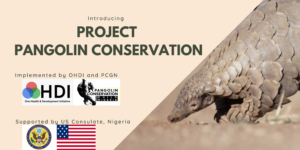
One Health and Development Initiative in partnership (OHDI) with Pangolin Conservation Guild Nigeria (PCGN) is happy to announce the introduction and launch of a new Project – Project Pangolin Conservation. The aim of the Project is to improve the conservation of Pangolins in Nigeria by promoting community-based advocacy and establishing local stakeholder response systems for monitoring, reporting, and addressing trafficking practices. We are happy to receive the support of the United States (US) Consulate in Nigeria to implement this project in our target location Epe LGA in Lagos State, Nigeria.
Pangolins are nocturnal, ant- and termite-eating mammals with all 8 species found in Asia and Sub-Saharan Africa. According to African Wildlife Foundation (AWF) (2019), Pangolins are the most trafficked mammals in the world and poachers kill 2.7 million African pangolins annually. Currently, their conservation status range from vulnerable to critically endangered due to intensive illegal international and domestic trade of their scales, their meat, and habitat loss.
The problem of illegal trade and trafficking of Pangolins has become of urgent concern in Nigeria as the country has particularly become a global pangolin scale export hub, accounting for 55 percent of seizures between 2016 and 2019. In Epe LGA, the target project site, there is a thriving wildlife market, and pangolin is believed to be one of the most traded.
The problem of pangolin trafficking in Nigeria is an issue that is borne out of several factors. These include poor community knowledge and indifference to pangolin conservation; poor political will and lack of enforcement of anti-trafficking laws; poor knowledge and capacity of LG/government/law enforcement officials on addressing pangolin trafficking practices, and high level of poverty in Nigeria. This is especially important in rural areas where most pangolins are found, and therefore people often resort to the illegal activity of pangolin capturing and trafficking as an option for income-generation
This project is urgently needed to address this intense trafficking of Pangolins because if not curbed, it may lead to the extinction of the entire order (Pholidota) to which Pangolin belongs to. Pangolins provide the earth with all-natural pest control and are fantastic tenders of soil. Through their everyday behaviors such as termite consumption and burrowing, they contribute to healthy ecosystem functioning. Furthermore, continuous disruptions of wildlife animals and habitats (like the Pangolin) increase the risk of zoonotic disease spillover from animals to humans – an emerging public health problem.
To solve this issue, the project will improve the conservation of Pangolins in Epe LGA, Lagos by promoting community-based advocacy and establishing linked local stakeholder response systems between community and local government levels for monitoring, reporting, and addressing Pangolin trafficking practices. Key objectives of the project include the following.
- To promote awareness and advocacy in communities and LGA parastatals in Epe LGA on pangolin conservation, and the threat of pangolin trafficking to the ecosystem and human health.
- To establish a committee of trained community stakeholders (e.g., group leaders, hunters, farmers, traditional herbalists) who will form a task force that will drive community action to protect pangolins and support monitoring, reporting and address trafficking issues and practices.
- To build the capacity of LGA and law enforcement officials who will be charged with the effective response and addressing pangolin trafficking practices reported at community levels.
This project will support and maintain Nigeria’s relations with the United States and vice versa as it fits in line with United States policies that support the Convention on International Trade in Endangered Species of Wild Fauna and Flora (CITES). Through this convention, the United States supports banning the commercial trade of all 8 pangolin species and their parts and empowers states and countries (Nigeria inclusive) to increase domestic protections to fight such threats facing the species.





